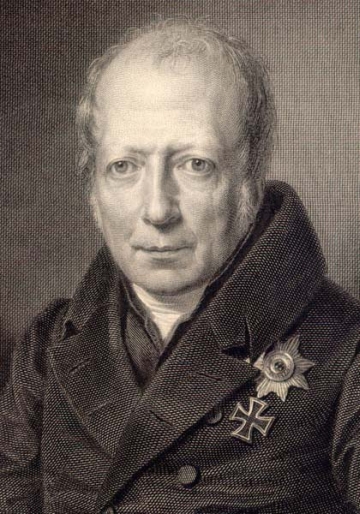<Back to Index>
- Philosopher Wilhelm von Humboldt, 1767
- Architect Nicolai Eigtved, 1701
- Member of Triumvirate of the Roman Republic Giuseppe Mazzini, 1805


Friedrich Wilhelm Christian Karl Ferdinand Freiherr von Humboldt (22 June 1767 – 8 April 1835), government functionary, diplomat, philosopher, founder of Humboldt Universität in Berlin, friend of Goethe and in particular of Schiller, is especially remembered as a linguist who made important contributions to the philosophy of language and to the theory and practice of education. In particular, he is widely recognized as having been the architect of the Prussian education system which was used as a model for education systems in countries such as the United States and Japan.
Humboldt was born in Potsdam, Margraviate of Brandenburg, and died in Tegel, Province of Brandenburg. His younger brother, Alexander von Humboldt, was an equally famous naturalist and scientist. Humboldt was a philosopher of note and wrote On the Limits of State Action in 1791-2 (though it was not published until 1850, after Humboldt's death), one of the boldest defences of the liberties of the Enlightenment. It anticipated John Stuart Mill's essay On Liberty through which von Humboldt's ideas became known in the English-speaking world.
(In fact, Humboldt outlined an early version of what Mill would later
call the "harm principle.") Humboldt describes the development of liberalism and
the role of liberty in individual development and in the pursuit of
excellence. Humboldt insisted on a minimal state dedicated strictly to
the preservation of security. Humboldt wrote a publication entitled ‘Ideas for an endeavour to define the limits of state action’ which
was completed in 1792, but was not published in full until long after
his death. The section dealing with education was published in the
December 1792 issue of the Berlinische Monatsschrift under the title
‘On public state education’. With this publication, Humboldt took part
in the philosophical debate on the direction of national education
which was in progress in Germany, as elsewhere after the French
Revolution. As Prussian Minister of Education, Humboldt oversaw the system of Technische Hochschulen and Gymnasien.
Humboldt’s plans for reforming the Prussian school system were not
published until long after his death, together with his fragment of a
treatise on the ‘Theory of Human Education’ which had been written in
about 1793. Here Humboldt states that ‘the ultimate task of our
existence is to give the fullest possible content to the concept of
humanity in our own person [...] through the impact of actions in our
own lives’. This task ‘can only be implemented through the links
established between ourselves as individuals and the world around
us’. Humboldt’s concept of education does not lend
itself solely to individualistic interpretation. It is true that he
always recognized the importance of the organization of individual life
and the ‘development of a wealth of individual forms’, but he stressed
the fact that ‘self-education can only be continued [...] in the wider
context of development of the world’. In other words, the individual is
not only entitled,
but also obliged, to play his part in shaping the world around him.
Humboldt’s educational ideal was entirely coloured by social
considerations. He never believed that the ‘human race could culminate
in the attainment of a general perfection conceived in abstract terms’.
In 1789, he wrote in his diary that ‘the education of the individual
requires his incorporation into society and involves his links with
society at large’. In his essay on the ‘Theory
of Human Education’, he answered the question as to the ‘demands which
must be made of a nation, of an age and of the human race’. ‘Education,
truth and virtue’ must be disseminated to such an extent that the
‘concept of mankind’ takes on a great and dignified form in each
individual. However, this shall be achieved
personally by each individual who must ‘absorb the great mass of
material offered to him by the world around him and by his inner
existence, using all the possibilities of his receptiveness; he must
then reshape that material with all the energies of his own activity
and appropriate it to himself so as to create an interaction between
his own personality and nature in a most general, active and harmonious
form’. As a successful diplomat between 1802 and 1819, Humboldt was plenipotentiary Prussian minister at Rome from 1802, ambassador at Vienna from 1812 during the closing struggles of the Napoleonic Wars, at the congress of Prague (1813) where he was instrumental in drawing Austria to ally with Prussia and Russia against France, a signer of the peace treaty at Paris and the treaty between Prussia and defeated Saxony (1815), at Frankfurt settling post-Napoleonic Germany, and at the congress at Aachen in 1818. However, the increasingly reactionary policy of the Prussian government
made him give up political life in 1819; and from that time forward he
devoted himself solely to literature and study. Wilhelm von Humboldt was an adept linguist and studied the Basque language. He translated Pindar and Aeschylus into German. Humboldt's work as a philologist in Basque has had more extensive impact than his other work. His visit to the Basque country resulted in Researches into the Early Inhabitants of Spain by the help of the Basque language (1821).
In this work, Humboldt endeavored to show by examining geographical
placenames, that at one time a race or races speaking dialects allied
to modern Basque extended throughout Spain, southern France and the Balearic Islands; he identified these people with the Iberians of classical writers, and further surmised that they had been allied with the Berbers of northern Africa. Humboldt's pioneering work has been superseded in its details by modern linguistics and archaeology, but is sometimes still uncritically followed even today. Humboldt died while preparing his greatest work, on the ancient Kawi language of Java, but its introduction was published in 1836 as The Heterogeneity of Language and its Influence on the Intellectual Development of Mankind. He is credited with being the first European linguist to
identify human language as a rule-governed system, rather than just a
collection of words and phrases paired with meanings. This idea is one
of the foundations of Noam Chomsky's theory of language. Chomsky frequently quotes Humboldt's description of language as a system which "makes infinite use of finite means",
meaning that an infinite number of sentences can be created using a
finite number of grammatical rules. Humboldt scholar Tilman Borshe
notes profound differences between von Humboldt's view of language and
Chomsky's. In recent times, Humboldt has also been credited as an originator of the linguistic relativity hypothesis (more commonly known as the Sapir-Whorf hypothesis), approximately a century before either Edward Sapir or Benjamin Whorf, but Humboldt's view of the differences between languages was more subtle and less rigid.